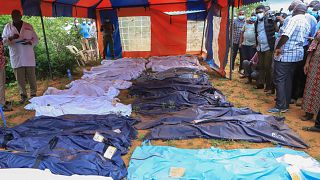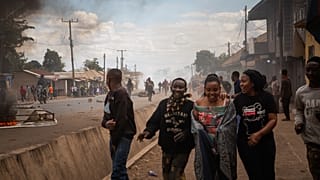Kenya
In a grim echo of a national tragedy, Kenyan authorities have exhumed five corpses from shallow graves just two kilometers from the site where over 400 followers of a doomsday cult perished two years ago. The discovery has sent shockwaves through the coastal region and raised alarming questions about the persistent influence of extremist religious teachings.
The operation, which began this week in the Kwa Binzaro area of Kilifi County, was conducted by a grim-faced team of homicide detectives, forensic specialists, and pathologists.
Government pathologist Dr. Richard Njoroge reported on Thursday that alongside the five bodies, investigators recovered ten scattered human body parts from nearby thickets.
The exhumation process is set to resume on Friday amid fears the death toll will rise.
“The exercise is ongoing, and we are treating this with the utmost seriousness,” Dr. Njoroge stated.
The scope of the potential tragedy is only beginning to emerge. Authorities have identified 27 additional suspected mass graves in the vicinity, heightening concerns that many more victims may be buried in the area. Investigations into the cause of death are now underway.
Eerie parallels to the Shakahola massacre
The discovery is chillingly close to the Shakahola forest, the site of one of Kenya's worst modern cult-related disasters. In 2023, the exhumation of over 400 bodies from shallow graves revealed the horrific extent of pastor Paul Mackenzie’s influence.
He had instructed his followers at the Good News International Church to starve themselves and their children to death in order to “meet Jesus.”
Mackenzie was arrested and charged with murder. He remains in custody awaiting trial.
The new graves, found a mere 1.5 miles from this epicenter of death, suggest a disturbing continuation or emulation of the same extremist ideology.
Suspects apprehended as investigation widens
In connection with the recent discoveries, police have apprehended eleven individuals believed to be former followers of Paul Mackenzie.
They have not yet been formally charged as investigations continue. Their arrests indicate authorities are probing possible links to Mackenzie’s network, though the exact nature of the new group and its beliefs is still unclear.
This development suggests that despite the massive public outcry and ongoing trial of a major cult leader, dangerous teachings continue to lure followers to their deaths in the same region.
A national reckoning on unregulated faith
The tragedy has once again cast a harsh spotlight on the regulation of religious groups in Kenya.
The country, with a deeply religious population, is home to thousands of churches, including several influential mega-churches.
Scrutiny has grown over alleged cult-like behaviors within some groups, including practices that isolate followers, prevent them from seeking medical care, or deny children an education.
The repeated discovery of mass graves in Kilifi County points to a persistent and deadly undercurrent within the nation’s religious landscape.
It raises urgent questions for authorities and citizens alike about how to protect vulnerable citizens from manipulation and extreme doctrines without infringing on religious freedom.
As the exhumations continue on Friday, a nation watches, hoping to find answers but fearing what else the shallow soil of coastal Kenya may reveal.












01:07
Nigerian government dismisses Trump’s claim of Christian killings
02:20
Artists gather in Morocco for the 17th Sufi culture festival in Fez
02:20
Devotees prepare to celebrate Diwali
01:48
Pope Leo XIV reminds Catholics of duty to welcome and assist migrants
01:00
A two-year-old girl is chosen as Nepal’s new living goddess
Go to video
South Africa: top police official testifies on criminal infiltration in justice system